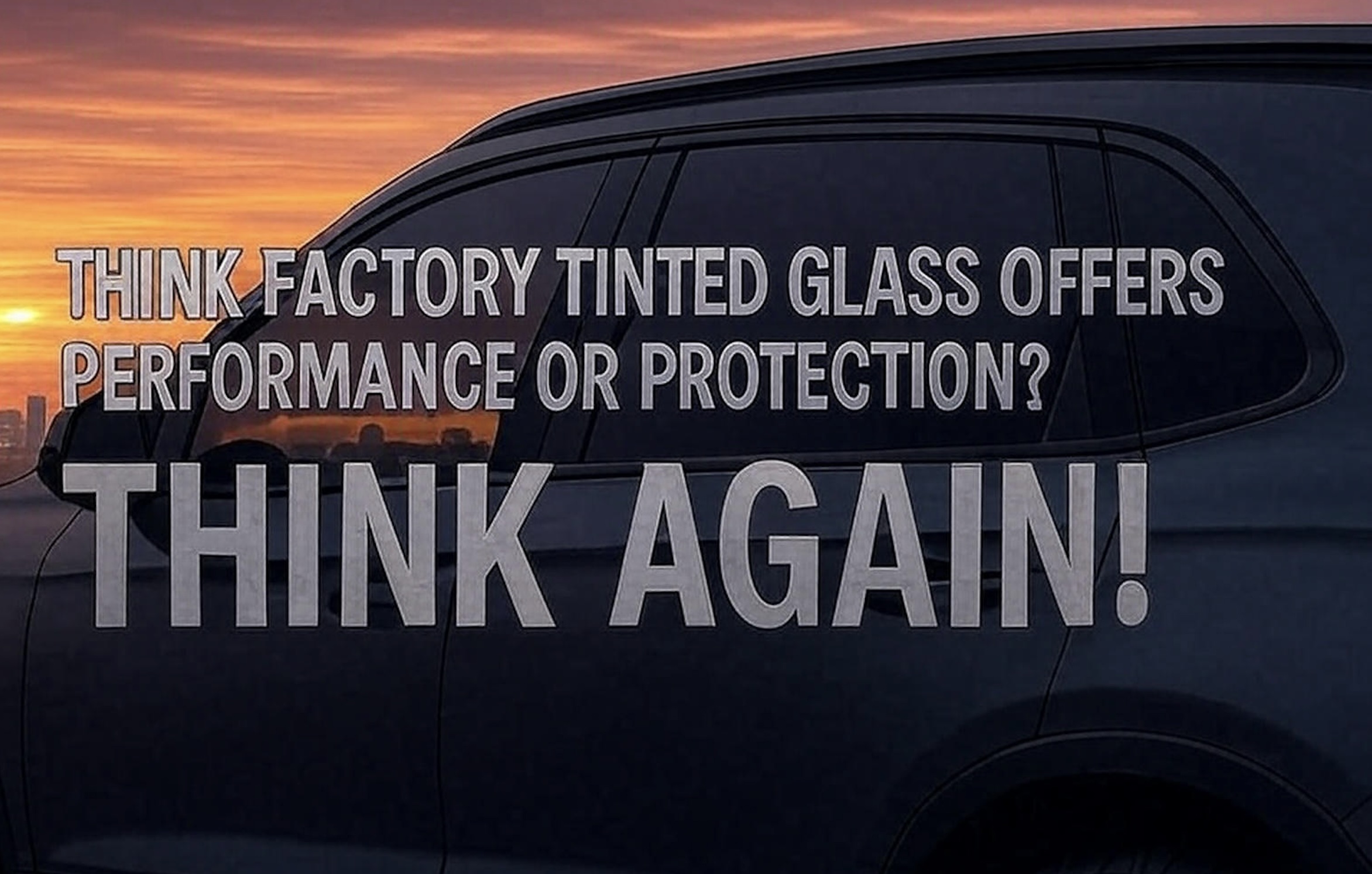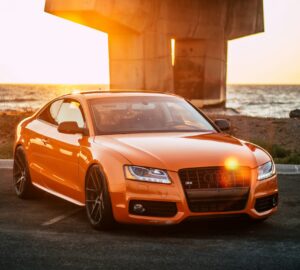Written by Patric Fransko from Window Film Pros
Think Factory Tinted Glass Offers Performance or Protection? Think Again!
If you drive a truck, SUV, or crossover vehicle manufactured in the last decade, it’s very likely your vehicle came equipped with factory tinted glass on the rear windows. This standard feature is appreciated by many drivers for its sleek appearance and the added privacy it provides for backseat passengers and cargo. As a result, many vehicle owners assume their factory tint is doing more than just looking good—they believe it’s offering sufficient heat rejection and UV protection as well.
But here’s the truth: factory tinted windows are often misunderstood. They are primarily designed for cosmetic purposes and privacy, not for performance. If you’re only tinting your front windows to “match” the rear and thinking you’re covered in terms of sun protection and heat reduction, you could be leaving your vehicle and passengers vulnerable to excessive heat and harmful ultraviolet (UV) radiation.
In this article, we’ll unpack the difference between factory tinted glass and professionally installed window film. More importantly, we’ll explain why relying solely on factory tint for protection is a mistake and how adding high-performance window film to your entire vehicle—including over the factory-tinted areas—can significantly enhance comfort, safety, and interior durability.
Understanding Factory Tinted Glass: What It Is—and Isn’t
Let’s begin by breaking down what factory tint actually is. Factory tint, also known as “privacy glass,” is glass that has been infused with dye during the manufacturing process. This type of glass is common on the rear side windows and rear windshield of SUVs, trucks, and minivans. Its primary purpose? Aesthetic appeal and privacy. It gives the windows a darker appearance that conceals what’s inside the vehicle to some degree.
However, while this glass may appear similar to aftermarket window film, it lacks the same performance features. Most factory tinted glass only blocks a small portion of solar energy—typically around 15-25% of heat—and while it might provide a limited amount of UV filtration, it’s not nearly enough to protect your skin or your vehicle’s interior over time.
This limited performance is what makes it crucial for vehicle owners to understand the distinction between appearance and function. Don’t let the dark color of your windows fool you. Dark glass doesn’t automatically mean UV or heat protection.
The Misconception: “My Rear Windows Are Already Tinted”
One of the most common assumptions we see among vehicle owners is that factory-tinted glass is doing everything that aftermarket window film would. So when they visit a window tinting shop, they often ask for only the front two windows to be tinted—to match the rear.
While the visual uniformity may look great, this approach leaves half of your vehicle unprotected from solar heat gain and harmful UV rays. More importantly, the driver and front passenger remain at higher risk because front windows typically come completely untinted from the factory.
Here’s why that’s a problem: exposure to UV rays doesn’t only happen when you’re outdoors. Every moment you spend behind the wheel without proper window protection adds up. You might not feel the damage being done, but your skin, eyes, and even your vehicle’s interior materials are absorbing the impact over time.
How Professionally Installed Window Film Enhances Protection
To understand the benefits of adding high-performance window film, even over factory-tinted glass, let’s look at two major advantages it brings.
- Superior Heat Rejection
If you’ve ever returned to your car on a hot summer day and felt like you were stepping into an oven, you already know how quickly a vehicle can trap heat. Solar energy enters your car through the windows, heating up seats, dashboards, steering wheels, and any electronics you’ve left inside.
Factory tint does little to block this heat. In contrast, modern, professionally installed window films are engineered to reject up to 60% or more of total solar energy. Some ceramic and nano-technology films go even further—blocking up to 97% of infrared heat, which is the main source of that stifling cabin temperature.
By installing high-performance window film on all windows—including those that are factory tinted—you drastically reduce how much heat enters the vehicle. This translates to:
- Cooler cabin temperatures
- Reduced reliance on air conditioning
- Better fuel efficiency
- Improved comfort for all passengers
And if you’re concerned about your vehicle looking too dark or violating local tint laws, don’t worry. Many window films are available in virtually clear or light shades that won’t noticeably darken your windows but still provide exceptional heat rejection and UV protection. This makes them an excellent choice for enhancing factory tint without altering appearance or raising legal concerns.
- Effective UV Protection
Here’s a sobering fact: over 50% of skin cancers in the U.S. occur on the left side of the body, which is more exposed to the sun while driving. This statistic, from a study published in the Journal of the American Academy of Dermatology, reveals the hidden danger of relying solely on your car’s glass for protection.
Most factory glass, especially in the front doors and windshield, offers little to no protection against UV-A rays—the type responsible for skin aging and increased cancer risk. While factory-tinted glass in the rear may block some UV-B rays (which cause sunburn), its protection is inconsistent and incomplete.
Professionally installed window film, on the other hand, can block up to 99.9% of UV rays. This level of filtration significantly reduces your exposure while driving and helps to:
- Protect your skin from premature aging and sun damage
- Lower your risk of skin cancer
- Preserve your vehicle’s interior, including seats, dashboard, and trim
- Prevent fading and cracking of upholstery and leather
This is why The Skin Cancer Foundation has awarded its Seal of Recommendation to many high-quality window films. They recognize the important role these products play in long-term sun safety, particularly for people who spend a significant amount of time on the road.
Beyond Comfort and Protection: Additional Benefits of Window Film
While heat rejection and UV protection are the most obvious advantages, window film offers a host of additional benefits that shouldn’t be overlooked.
Enhanced Safety and Security
Window film adds a layer of protection that helps hold shattered glass together in the event of an accident or break-in attempt. This can reduce the risk of injury from flying glass and deter would-be thieves who can’t easily gain access through a reinforced window.
Glare Reduction
Driving into a rising or setting sun can be blinding—and dangerously distracting, especially during early morning or late evening commutes. High-quality window film significantly reduces glare, enhancing visibility, minimizing eye strain, and lowering driver fatigue during long trips or daily drives. This added comfort promotes safer, more focused driving in bright conditions.
Privacy Without Compromise
Even if your factory tint provides some privacy, it may not be enough. Professionally installed window film can be chosen in a range of darkness levels to improve privacy without sacrificing visibility or performance.
Improved Aesthetics
Let’s face it—uniform window tint just looks better. A professional installation can give your vehicle a clean, sophisticated appearance, while also hiding clutter and valuables from outside view.
Complying with Local Tint Laws
Before choosing a window film for your vehicle, it’s essential to familiarize yourself with your state’s specific window tint laws. Each state sets its own legal limits regarding visible light transmission (VLT), reflectivity, and tint placement—especially on front side windows and windshields. Installing a film that’s too dark or overly reflective can result in costly fines, failed vehicle inspections, or even being required to remove the film entirely.
Luckily, experienced and reputable window film installers stay up to date with local regulations and can help you choose a product that is both compliant and high-performing. For drivers who prefer not to darken their windows further, there are excellent options available—such as nearly clear or lightly tinted films—that provide full-spectrum UV and infrared heat rejection while staying within legal limits. This allows you to enjoy the comfort, protection, and performance benefits of window film without running afoul of the law.
The Bottom Line: Why You Should Upgrade from Factory Tint
So let’s recap: while factory-tinted glass provides a sleek look and basic privacy, it’s not designed to protect you from the sun’s heat or harmful rays. Professional window film fills in the performance gaps by:
- Offering superior heat rejection for a cooler, more efficient ride
- Delivering robust UV protection to safeguard your health and interior
- Enhancing safety, privacy, and appearance
- Helping you save money on fuel and interior repairs over time
Simply put, factory tint isn’t enough. To truly protect your vehicle—and yourself—from the elements, professional window film is a smart, affordable upgrade.
Ready to Protect Your Vehicle the Right Way?
If you’re among the 208 million licensed drivers in the U.S., this is a crucial time to reconsider what your factory tint is (and isn’t) doing for you. Whether you commute daily, drive for work, or take road trips with family, protecting yourself and your passengers from heat and UV exposure should be a top priority.
Before you decide, be sure to check your local tint laws to ensure your vehicle remains compliant. You can find this information through trusted tint resources or by contacting local authorities.
Want to learn more about the benefits of automotive window film or schedule a free consultation? Contact Us today. We’ll answer your questions, walk you through your options, and help you make an informed decision that enhances your comfort, safety, and peace of mind on the road.
Let us help you go beyond the factory tint—protect your drive, inside and out.





![Is Your Tint Legal? Great State Window Tint Laws in 2024 - Window Tint Laws in the United States and Canada -Window Tint Percentage Laws In The United States -What Window Tint Percentage Is Legal in My State? [2025]](https://windowfilmpros.com/wp-content/uploads/2023/06/Screenshot-2024-05-04-at-10.49.29 AM-1024x780.png)



